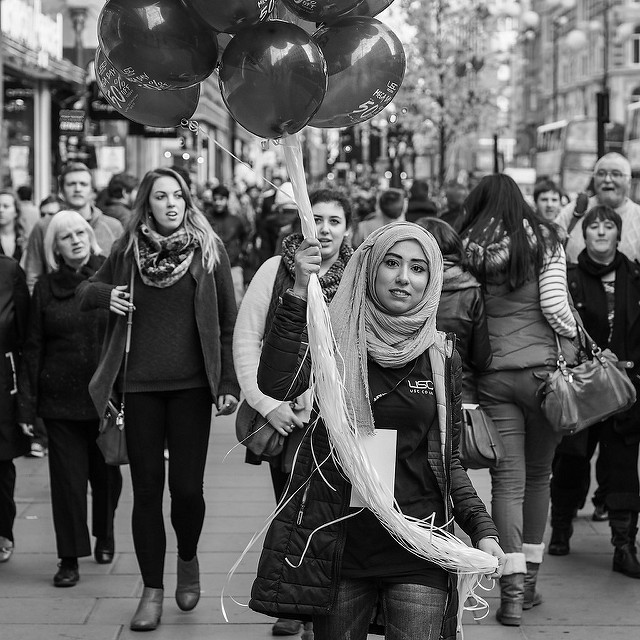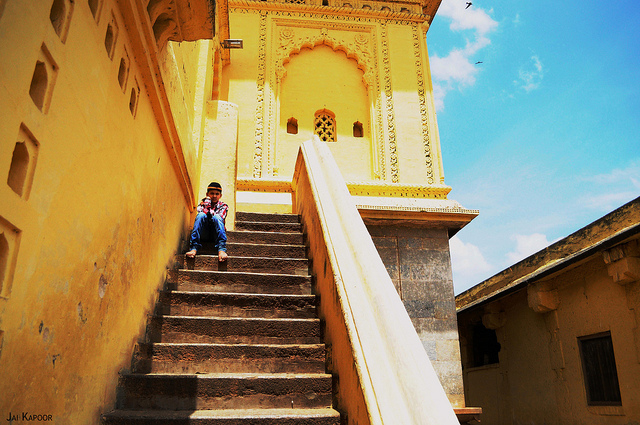
On a sweltering August night six years ago, in a small house on the west coast of Java, I was jolted from sleep by a parade of noise.
A large group of people was trotting through the roads, shouting, singing, banging on drums and bowls and other remarkably loud contraptions. Flailing in the folds of my mosquito net, I peeked out the window and saw a grinning child rattle the gate outside my house, then wave and prance away. I had to smile, despite my distaste for being awake. It was the beginning of Ramadan, and the dead-of-night-street-chorus was a reminder to get up and eat, in preparation for the day of fasting ahead.
Ramadan, a holy month in Islam, commenced for many communities this year on June 6th and will continue until the evening of July 5th (this depends on the year as it falls on the first day of the month of Shawwal). Those who are mentally and physically fit have been fasting from dawn until sunset each day. Prayer, generosity and small celebrations have also been a part of each day, all leading up to the culminating celebration of Eid al-Fitr, the festival of fast breaking, set to fall on the July 6th.
Though I am not Muslim and have never participated in fasting for Ramadan, I was fortunate enough to live in Indonesia for a time, which is home to the largest Muslim population in the world. It was a unique opportunity to learn what Islam is about, and not only the rules and customs, but the heart and soul of it. Unfortunately, the religion continues to be misrepresented by a handful of people, and misunderstood by many more. Over the past few weeks, considering the significant time of year, I turned to some of my nearest and dearest Muslim friends to seek some fresh insight. They have helped me locate the words to express some of the truths about both Islam and the art of living that are embedded in Ramadan.
Whether we are religious or not, regardless of the part of the world or culture or skin we happened to be born into, there are some things we can learn from those who are currently participating in the fasting month. These are valuable reminders on how to live, suitable for anyone aspiring to be a mindful human. Or even just a happy one.
Return to what matters most.
The abstinence from eating and drinking during Ramadan serves several purposes, one of which is to remove distractions and bring life into focus. It is a way of simplifying, or slowing down. It’s a time to highlight what is most important in life, which allows that which no longer serves to fall away. Voluntarily abstaining from eating and drinking all day requires discipline, and as Aristotle reminds us, “through discipline comes freedom.” In this case, it is the freedom to let go of mental and emotional clutter, and allow that which matters most to come to the forefront.
According to my friends, Ramadan is a time for knowing ourselves as creatures of God. It is a time to reflect on what we have done before, and learn from it. “Religion” is not the focus, rather attention should turn to the safety and caretaking of all relationships, looking to God as a lighthouse. (If God feels like a slightly overbearing word, insert something else that feels right. Love is a good one. The idea is the same either way.)
Respect for all living creatures is one of the most important ideas to focus on during this time, because Islam means safe from harm. That includes not harming ourselves, body and spirit, other people, or the environment. Cultivating these relationships and keeping them safe is the foundation for a stronger connection with God. It makes sense to me, as I see the spark of the divine in the people I love, in animals and in nature. Whatever we want to name the forces at play in the universe, I never feel closer to them than when I am connected to another living creature or immersed in the wild. Ramadan is a time to direct our focus to the caretaking of our relationships with all breathing, moving things and our stewardship of the earth. When we are hungry or thirsty, it is an opportunity to redirect our focus, but we are also more likely to lose patience, so the whole process is something of a spiritual workout that builds strength for the future.
The routine is practiced for a month in order to form habits that will endure throughout the rest of the year. The fasting is the mechanism; the habit is the way of thinking, living and making choices—a manner of traveling that takes time each day to come back to and honor that which matters most. Whatever it may be for each of us—God, family, friends, pets, meaningful work, joy-soaked experiences, or anything else that lights us up and roots us down—we can make a practice of carving out the time to come back to it and give attention to it every day.
Give thanks and be of benefit.
I’ve found travel to be one of the most effective ways to cultivate gratitude in my life. It constantly gives and takes away. My appreciation for the good in all kinds of different circumstances becomes vivid when I move to a new destination and have to let things go. When I’ve been away from home for a while, something as simple as a hot shower in my own bathroom can make me glow with thankfulness. Yet when I’ve been home too long and finally find myself back on the road, I have a renewed appreciation for every piece of it—the dusty buses, the unfamiliar languages, a handful of foreign coins used to buy a cold-ish beer. I revel in these tokens of adventure.
The same can be said of fasting. It’s an effective way to refresh our gratitude for having enough to eat to experience what it feels like to not have enough to eat. To let go of something for a time, until it comes back to us again and we are able to see it with clear, bright eyes. The perspective that comes with this kind of experience also encourages attention to and compassion for the hundreds of millions of people in the world who live in hunger every day. Those who celebrate Ramadan seek meaningful connection with others who have been born into different circumstances.
Directing our attention to the blessings in our lives goes beyond food, too. When a person who is fasting during Ramadan feels hungry or thirsty, they direct their thoughts to the many different things they have to be grateful for. It’s a practice that generates momentum quickly, as we realize how much we have.
Gratitude is an expansive force that spills over into other parts of our lives. It is a precursor to being of benefit. When we acknowledge how rich we are, when we realize that we have more than enough, we loosen the holds that the scarcity mentality has over our everyday actions, and our desire to help others live just as fully is stoked. We want to share, we want to reach out. Ramadan is a time filled with charity and the mindset of giving. This is a theme throughout Islam, with Eid al-Adha being another important holiday focused on service to others.
As my friend Ocha says, “The awareness of the gratefulness to God that I have during Ramadan is what makes it special.”
Choose forgiveness.
Ramadan is a time for acceptance, forgiveness, and reflection. A friend told me recently, “In Ramadan I will take time to reflect on what I have done, that is when I can try to forgive myself, and accept whatever has been given to me when things in life sometimes are not exactly what I want.”
When we think about forgiveness, we usually make the immediate leap to thinking about other people who we might need to forgive or be forgiven by. We often step right over that first, most foundational act, which is forgiving ourselves—for not being perfect, for perceived failures and disappointments, whatever those might look like for each of us. Self-forgiving means that those burdens are not ours to carry anymore. That they aren’t making us more loving humans, and that it’s time to move forward. This is living in the present moment. This is when we are able to turn what is before us into magic instead of dead weight.
Ramadan culminates in the celebration of Eid al-Fitr, when Muslims ask forgiveness of one another and seek to move ahead, rather than stay trapped in the shortcomings of the past. In Indonesia, people greet one another during this time with the phrase “mohon maaf lahir dan batin” which means “forgive my wrongdoings,” or “forgive me body and soul.” Though I am not Muslim, I was welcomed to participate in this ritual, and did so happily. It felt wonderful to say this simple phrase to people—to the teachers I worked with, to the families I lived near, to the becak driver who took me home from work and to the woman selling coconut rice near my house. There is something incredibly powerful about taking responsibility for everything we may have done to hurt other people, intentionally or otherwise, acknowledging that body of regret, and releasing it.
Forgiving means accepting things as they are, and acceptance of our circumstances is an extension of gratitude—when we are grateful, we are able to see the value in what we have and the potential for how we can work with it. Acceptance isn’t synonymous with defeat, as many of us fear. It is actually the beginning of creativity and tenacity, the ability to spin gold not just in ideal situations, but in difficult ones, too. It leads us on into reflection—the willingness to learn and the determination to grow.

Never stop learning.
My friends were taught how to follow Islam when they were children, but continued their own studies as they went through university and adult life. Though they all share similar ideas about love, forgiveness, service and faith, I have seen them practice in their own unique ways, built on personal philosophies.
During Ramadan, my friend Ocha describes hearing the beautiful readings of the Quran before dawn. Those readings have inspired her to learn more about the meanings behind the verses, to understand what she has heard in a deeper way. As a child, she followed the rules of Islam to stay out of trouble with her mother and avoid judgment from other people. She was a precocious child though, and questioned what value there was in following a routine when her heart wasn’t in it. She grew up in a Muslim community, and it was easy to follow the rules since this was the normal way of living. But adopting a way of life just because it was there wasn’t good enough for her. She wanted to make up her own mind on the subject.
As an adult, she took on her own study of the Quran, had more exposure to the world, had different types of friends from different religions, and had discussions about religion with different people. She came to understand what her faith meant to her in a personal way. She found new dimensions to it in the accumulation of life experience and constant learning. She now practices the rituals and routines of Islam because they mean something to her. She is not afraid to follow her own truth, stay open to new learning, and live with love and respect for all creatures, including herself.
Ramadan is a time that makes space for study and reflection. Regardless of our manner of traveling in life, we can all seek to learn as much as possible while we’re here. Education is the key to freedom, compassion and authenticity. It is living in the flow of endless questions, never stagnating in alleged answers. Answers might come for a moment, but they are not a headstone to be planted in the ground and declared finished. They are alive, they change, they give rise to the next questions. We must remember to let the receiving of answers and the asking of questions be a fluid process.
Open your heart.
The school I worked at in Indonesia was a mixed bag of religious devotion—Muslims, Christians, Buddhists and Western teachers who were finding salvation in travel. We all shared classrooms and friendships. Mosques and churches stood side by side in the roads. At the start of school each morning, everyone took a moment to pray in their own way, or to simply sit quietly and breathe.
That’s not to say that no one ever gossiped, lied, or hurt anyone else’s feelings—those bits of humanity transcend all belief systems, because we are all works in progress. There was, however, an openness that allowed the ups and downs to flow, rather than get stuck washing up against closed doors.
Ramadan is a time to remember to keep an open heart. My friend Indah tells me that the Quran instructs Muslims not to pursue other people who have their own faith, or pressure people to embrace Islam, but to simply answer their questions when they ask and to respect and be of service to everyone. Her words resonate with me because they so aptly describe my experience living in Java.
I was curious about everything, and most of the people I met were curious about me too. It was an ongoing exchange of questions and ideas, and even when the actual words were lost in translation, the spirit of inquiry (and confused laughter) were palpable on both sides. It wasn’t just that people respected one another, they wanted to really enjoy the time we had to spend together. At our school Christmas show, the Muslim teachers wore Santa hats and reindeer antlers. On Eid al-Fitr, I was invited to shake hands with everyone, eat all the special foods, and switch outfits with my friend Indri (she wore my hoodie and I wore her veil).
When people are strong, they are able to be open. They don’t need to prove or parade their own truths. They are able to honor all lives with all the differences that color human communities. Keeping an open heart is a brave act, an acknowledgment that our short, sweet time on this earth is not meant to be spent controlling and overpowering one another, but learning and loving at every turn.
Remember to celebrate.
Life requires us to discipline ourselves, and it’s a good practice to be in, but the balancing force to this discipline is light-hearted celebration. It’s the opportunity to “free ourselves from concern,” as Jim Carrey once put it. Ramadan hasn’t forgotten this.
Each evening during Ramadan feels like a mini-celebration as the sun sinks below the horizon and the food carts begin to glow. The sound of hissing oil swirls between the clanging of dishes, while smells of ginger, chili peppers, shrimp paste and peanut sauce lace the air. Many favorite foods are cooked only during this special time of the year, and everyone has a list of the snacks they are going to seek out at the end of the day. They follow up their well-earned indulgences with time spent in prayer and with family.
The important thing about this is that people discipline themselves throughout the day, but they also remember to acknowledge those sacrifices. They show a little love to themselves for doing something that was difficult. They end the day on a note of appreciation, for their accomplishments as well as the treats they now allow themselves to enjoy.
It’s a great practice to mimic, even if we aren’t fasting. To take a moment to appreciate what we have done with the day; what we have tried for and how we have showed up and practiced. The chances to be kind that we took, the opportunities to learn that we gave attention to. So often we worry over what we haven’t done, we miss out on the energy and momentum that come from acknowledging the good.
Of course, the big celebration is waiting at the completion of the fasting month. Eid al-Fitr is a time for family, delicious food, fireworks, prayers, service to others and everything joyful. Reminding us how to take the time, every now and then, to simply exult in being alive.
We can all celebrate during this time of year by giving love and respect to the different cultures, religions, and ways of traveling through this world. Stay curious, be brave, “and above all,” as Roald Dahl reminds us, “watch with glittering eyes the whole world around you, because the greatest secrets are always hidden in the most unlikely places. Those who don’t believe in magic will never find it.”
Thank you to Ocha and Indah for sharing your perspectives and insights. Love you both.
~
Author: Chrissy Tustison
Image: Matthew G/Flickr // Miraage.clicks/Flickr // David Goehring/Flickr
Editors: Caitlin Oriel; Katarina Tavčar










Read 2 comments and reply